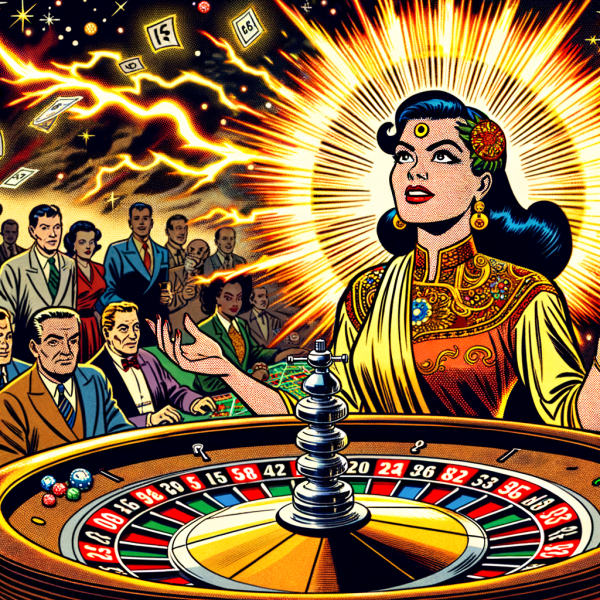Introduction: Unveiling the Psychic Gambler Phenomenon
In the world of gambling, stories of individuals using supernatural abilities to gain an edge at the casino have emerged from the shadows of skepticism and intrigue. One such figure, often referred to as the “psychic gambler,” claimed to harness psychic powers to predict outcomes and manipulate probabilities in her favor. This phenomenon raises critical questions about the boundaries between luck, skill, and purported supernatural abilities. The convergence of these elements has sparked discussions that go beyond mere entertainment, shaking the foundations of the gambling industry itself.
This article will explore the mechanics of casino games, the claims surrounding psychic gambling, and the legal implications involved. Additionally, it will delve into the broader impact of such stories on the gambling landscape, examining how they challenge traditional notions of chance and skill. As we navigate through these themes, we will also analyze whether the success of this psychic gambler is a product of genuine psychic powers or merely an astute strategy masked as something mystical.
The allure of the psychic gambler is not just in her victories but in the question it poses: can one truly transcend the deterministic nature of gambling through unexplainable means? This exploration will also touch upon the psychological factors that contribute to belief in these powers, thereby enriching our understanding of human behavior and cognition in gambling contexts.
In a world where skepticism often reigns supreme, the tales of psychic gamblers compel us to reconsider our definitions of luck, chance, and skill, posing the question—what if there is more to the game than meets the eye?
The Mechanics of Casino Games: Luck vs. Skill Debate
Casino games often operate on two foundational principles: luck and skill. Games like slot machines rely heavily on chance, where outcomes are determined by random number generators. In contrast, games such as poker or blackjack require a degree of skill, allowing players to influence their odds through strategy and decision-making. This dichotomy fuels debates among gamblers and enthusiasts alike regarding which elements are paramount in determining success.
The introduction of a psychic element adds another layer of complexity to this debate. If one can predict outcomes using psychic abilities, it effectively shifts the paradigm. Rather than relying solely on luck or skill, the psychic gambler’s success could be attributed to an entirely different category of influence. The question then arises: if psychic predictions are valid, do they undermine the traditional understanding of luck and skill?
Critics argue that attributing success to psychic powers diminishes the intellectual rigor that many skilled players apply. However, proponents of the psychic gambler phenomenon assert that it presents an opportunity to reevaluate how we perceive risk and reward in gambling. This debate not only attracts attention from the gambling community but also captures the interest of psychologists who study the cognitive biases that influence gamblers, including the gambler’s fallacy and the illusion of control.
Ultimately, the mechanics of casino games provide a rich backdrop for understanding the dynamics at play in the narratives surrounding psychic gambling. The intersection of luck, skill, and the possibility of psychic influence challenges established beliefs and demands a thorough examination of what it means to “beat the house.”
Analyzing the Claims: Psychic Abilities or Clever Strategy?
While the stories of psychic gamblers can be captivating, they invite skepticism. The claims of having the ability to foresee outcomes often lack empirical evidence. Critics argue that consistent wins in gambling can often be attributed to clever strategies, comprehensive understanding of game mechanics, and acute observational skills rather than any genuine psychic phenomena.
Moreover, the psychological aspect cannot be understated. The confidence that comes with believing one possesses psychic powers may lead to better decision-making in high-pressure situations. In this regard, the alleged psychic abilities could be serving as a mental boost, enhancing the gambler’s performance through sheer belief and positive reinforcement. This phenomenon, often referred to as the “placebo effect” in cognitive performance, underscores the powerful role that mindset plays in gambling outcomes.
To further dissect these claims, one might consider the various cognitive biases that could lead individuals to perceive luck or skill as a form of psychic ability. For example, pattern recognition—a natural human tendency—can mislead gamblers into believing they are experiencing something supernatural when, in fact, they are simply observing random occurrences.
Ultimately, the debate remains unresolved. While some individuals may genuinely believe in their psychic abilities, the question of whether these abilities provide a meaningful advantage in gambling remains contentious. For every compelling anecdote, there are equally plausible explanations rooted in skill and strategy.
Legal and Ethical Implications of Psychic Gambling Practices
The rise of psychic gambling raises significant legal and ethical questions within the gambling industry. Casinos are heavily regulated environments, with strict guidelines governing the behavior of players and the integrity of games. Claims of psychic abilities could potentially lead to violations of these regulations, prompting concerns about fairness and transparency.
Furthermore, the ethical implications of promoting psychic gambling practices cannot be ignored. If individuals are led to believe that they can gain an unfair advantage through psychic means, they may risk substantial financial losses. This exploitation of belief can raise moral questions regarding responsibility and the role of casinos in protecting vulnerable consumers.
From a legal standpoint, the gambling industry must grapple with how to address claims of psychic abilities. While many jurisdictions classify gambling as a game of chance, the introduction of purported psychic influence complicates matters. Existing laws may need to adapt to account for this new dimension, creating potential challenges for regulators seeking to maintain the integrity of the industry.
In summary, the legal and ethical ramifications of psychic gambling practices extend far beyond individual stories. They encompass broader concerns about consumer protection, regulatory frameworks, and the moral responsibilities of both players and casino operators. Understanding these implications is essential to navigating the future of gambling in a society increasingly fascinated by the intersection of chance and the supernatural.
The Impact of Her Success on the Gambling Industry
The success of the psychic gambler has not only drawn attention to the individual but has also had wider implications for the gambling industry. Her story has echoed through various media outlets, inspiring a surge of interest in both psychic phenomena and gambling strategies. This increased visibility has led to the emergence of a niche market where individuals seek to understand and possibly replicate her alleged methods.
Casinos, ever vigilant to maintain their edge, have responded to this phenomenon by tightening security measures. Increased surveillance and monitoring of gameplay have become commonplace as operators seek to deter any potential manipulation of the gaming process, whether grounded in skill, luck, or psychic claims. This shift underscores the industry’s commitment to ensuring fairness and protecting their bottom line.
Additionally, the narrative surrounding the psychic gambler has catalyzed a broader discussion about gambling practices and the nature of luck. It has illuminated the psychological aspects of gambling behavior, inviting researchers and enthusiasts alike to delve deeper into what drives individuals to gamble and how beliefs—whether rational or irrational—impact decision-making.
Ultimately, the impact of her success extends beyond the individual, prompting the gambling industry to reassess its strategies and adapt to an evolving landscape. The interplay of belief, psychology, and chance continues to shape the world of gambling, ensuring that the conversation around psychic gambling remains relevant and provocative.
Conclusion: Understanding the Intersection of Psychology and Chance
As we reflect on the story of the psychic gambler, it becomes evident that her narrative is a microcosm of broader themes in the realm of gambling. The intersection of psychology and chance complicates our understanding of what it means to win or lose, challenging long-held beliefs about randomness and skill.
While skeptics may argue against the existence of psychic powers, the psychological factors at play cannot be overlooked. The allure of the supernatural taps into deep-seated human desires for control and meaning in uncertain situations, particularly in the high-stakes environment of gambling. The belief in psychic abilities can serve as a powerful motivator, influencing behavior and decision-making in ways that merit further exploration.
Moreover, the ramifications of this phenomenon extend to legal and ethical considerations within the gambling industry. As stories of psychic success continue to capture the public’s imagination, the need for a nuanced understanding of these dynamics becomes increasingly important.
In conclusion, while the narrative of the psychic gambler may straddle the line between folklore and reality, it invites us to delve deeper into the psychological complexities that govern human behavior in gambling. As we continue to explore the realms of luck, skill, and belief, we may find that the true game is not merely about the cards dealt or the roll of the dice, but also about the stories we tell ourselves in pursuit of fortune.
Q&A Section
Q: Are psychic gambling techniques legal?
A: The legality of psychic gambling techniques can vary by jurisdiction and may raise ethical concerns. Many casinos have regulations against cheating or manipulating outcomes.
Q: Can belief in psychic abilities improve gambling performance?
A: While belief in psychic powers can enhance confidence, which may lead to better decision-making, it does not guarantee success.
Q: How do casinos respond to claims of psychic gambling?
A: Casinos often tighten security measures and monitoring to prevent any manipulation of the games, ensuring fairness and integrity.
Q: Do psychological factors play a role in gambling outcomes?
A: Yes, psychological factors such as cognitive biases, belief in luck, and risk perception significantly influence gambling behavior and outcomes.
Q: What impact does the story of the psychic gambler have on the industry?
A: The narrative has spurred greater interest in gambling strategies, prompted discussions about fair play, and encouraged casinos to adapt their practices.




